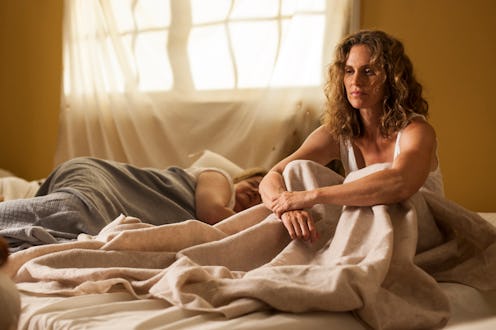
These next few weeks aren't going to be easy for those who commit themselves to HBO's new drama The Leftovers . The series is an extremely bleak look into the affects of a rapture-like phenomenon that takes two percent of the world's population off this Earth in less than a second. While two percent may seem like a negligible amount, it's enough to send fear into the hearts of those left back after the departure and the resultant panic, strife, and despair is the meat of this new series from author Tom Perrotta and former LOST co-creator Damon Lindelof. And while turning on the TV to wade in existentialism every Sunday night probably isn't high on most viewers' lists, The Leftovers is worth the turmoil.
Having seen the first few episodes, I can assure you that this series isn't the Justin Theroux show, following the good cop Kevin Garvey through his adventures in keeping his lil' old town together. Theroux's character is suffering through this October 14 "rapture" just like everyone else, losing his wife Laurie (Amy Brenneman) to the local organization and could-be cult The Guilty Remnant, losing his daughter Jill (Margaret Qualley) to emotional rebellion, losing his son to a mysterious spiritual leader out West, and eventually losing his own mind, piece by piece. But his journey isn't the center of the series, nor is it the only focus. The Leftovers spreads a wide net.
We meet Meg (Liv Tyler) who has almost no connection (to our knowledge) to any of the other characters, but who is burdened in a way she almost can't explain since the great departure of the two percent. There's the local pastor, who's committed to proving that this "rapture" couldn't have been the rapture because there were rapists and gamblers and thieves taken along with the good an the innocent. There's Garvey's son (Chris Zylka) out in the desert of New Mexico, carrying out the wishes of some great leader in fear after having witnessed two of his classmates kill themselves (presumably due to the guilt that has accompanied those who did not depart on October 14). With the exception of the people in Garvey's family, there's little rhyme or reason as to why certain characters are a part of the narrative landscape and it creates a sense of overwhelming despair — the series makes certain that we know this feeling of unhinged uncertainty is widespread and affecting everyone inside and outside of Kevin Garvey's little town.
On television, we've seen what traumatic events can do to one man or one family or even one localized group of people, but we've yet to see it on an epidemic scale. The Leftovers does just that and what that new experience opens up a different part of our ability to understand trauma and the resultant set of emotions. Counterintuitively, The Leftovers almost cuts deeper as a result of its breadth.
And while, at times, the impatience of the score feels like a fly buzzing in our ears, begging us to feel something right now, right in this moment... or else and the series' penchant for quick, jarring cuts to characters' memories often obscure meaning in the name of guttural emotion, over all The Leftovers is worthwhile journey. Just don't expect it to inspire any fun TV theme parties.
Image: HBO